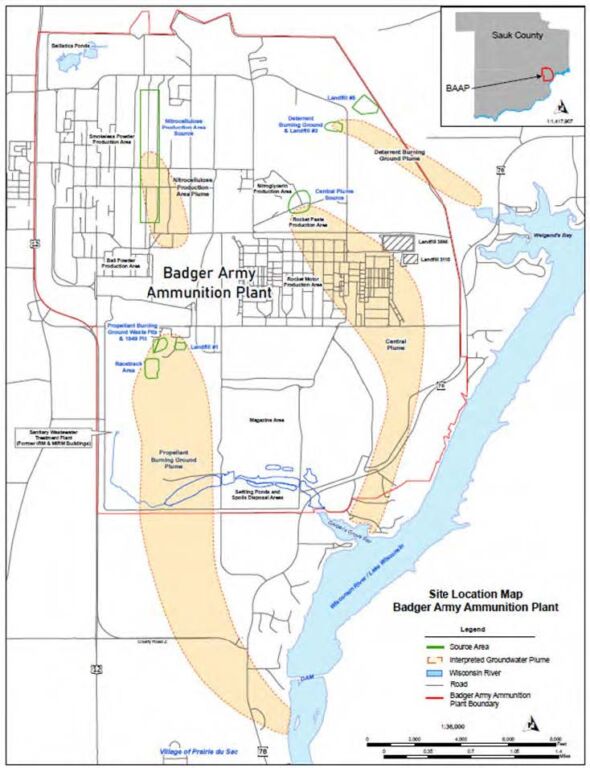
The U.S. Army Environmental Command has informed the Wisconsin Department of Natural Resources (WDNR) that it will NOT comply with the State’s enforceable groundwater standards for certain cancer-causing chemicals that have migrated to groundwater. For decades, contamination from the former 7,400-acre Badger Army Ammunition Plant has been moving offsite and now poses a threat to as many as 300 residential drinking water wells in rural Sauk County.
(See HOW YOU CAN HELP below.)
To date, the WDNR has submitted three formal requests for compliance with groundwater standards to the Army – letters were issued in June and October of 2023 and again in October 2024. Described as an uncooperative responsible party, the Army is arguing that while promulgated state law requires a more protective 1×10-6 cancer risk threshold for ALL groundwater, the Army is demanding that the State accept a level of cleanup that is 100 times LESS protective of human health (1×10-4) for the Badger lands.
The Army’s refusal to comply with state groundwater standards means that a number of toxic and cancer-causing chemicals found at Badger will not be targeted as Chemicals of Concern (COCs) in the Army’s final cleanup plan for the four groundwater contaminant plumes emanating from the former military base. Ownership of the Badger lands has been transferred from the Army to the WDNR, U.S. Department of Agriculture, Ho-Chunk Nation and Town of Sumpter however the Army remains responsible for cleanup.
If granted, the exceptions sought by the Army will have significant ramifications, including removing requirements to address certain contaminants of concern in groundwater including 1,2-dichloroethane, bromodichloromethane, naphthalene, benzene, and the explosive 2,6-dinitrotoluene – all of which are known or suspected human carcinogens.
Entrenched as an “uncooperative” responsible party, the Army is now digging in its heels. “Since (cancer risk) is the only comment received from WDNR on the Proposed Plan, the proposed (groundwater cleanup) plan therefore will be considered final and we will move to public comment,” the Army’s November 25, 2024 letter to WDNR declares.
If the U.S. Army at Badger successfully mows over the State and is not required to comply with promulgated state law, the action will set a far-reaching negative precedent compromising the cleanup of cancer-causing chemicals in host communities throughout Wisconsin.
PFAS chemicals, for example, are used in munitions production and have been detected in groundwater at Badger Army Ammunition Plant and the following military bases:
- General Mitchell Air Reserve Station (BRAC) (Milwaukee, WI)
- General Mitchell State Air National Guard Base (Milwaukee, WI)
- Madison Army Aviation Support Facility #2 (Madison, WI)
- Truax Field State Air National Guard Base (Madison, WI)
- S. Army Garrison Fort McCoy (Sparta, WI)
- Volk Field State Air National Guard Base (Camp Douglas, WI
- West Bend Army Aviation Support Facility #1 / Armory (West Bend, WI)
While Wisconsin groundwater standards for PFAS chemicals are pending, the WDNR is authorized to use Health Advisory Levels currently set by the Wisconsin Division of Health as site-specific cleanup goals in selecting the type and duration of an NR 140 groundwater remedy.
Approximately two thirds of the people living in Wisconsin rely on groundwater for their drinking water.
HOW YOU CAN HELP:
CSWAB is encouraging members of the public to submit courteous comments to Wisconsin Governor Evers urging his office to act to assure that the Department of Defense fully complies with state environmental rules and regulations and act to protect the health and sustainability of Wisconsin’s groundwater at Badger Army Ammunition Plant and throughout the state.
Submit your comments to Governor Evers online at https://evers.wi.gov/Pages/Home.aspx
Since 1990, CSWAB has worked to support, unify and strengthen citizens concerned for the safety of water resources in and around the Badger Army Ammunition Plant; to effect expedient cleanup of any contamination caused by negligent handling of toxic waste; and to exercise means as necessary to guarantee water resources are free of toxic contamination for us and the generations to follow.
DNT Fate and Transport U.S. Air Force Jim Spain 2001
WDNR Comments on Draft Proposed Plan for Site-Wide Groundwater Badger 2 June 2023
WDNR Comments on Revised Draft Proposed Plan for Badger Site-Wide Groundwater 19 Oct 2023
WDNR Comments Nitrocellulose Plume 17 HoChunk July 2024
WDNR Comments on Army Proposed Plan for Site-Wide Groundwater Badger 17 Oct 2024
Army Response to WDNR Comments Sitewide Groundwater Remedy 25 Nov 2024
Proposed Plan for Sitewide Groundwater Contamination Badger Army Dec 2024
Resolution RAB Supporting WDNR and Compliance with Wisconsin’ Groundwater Standards Jan 2025
Badger AAP Restoration Advisory Board RAB Slide Deck Jan 16 2025
Badger AAP Restoration Advisory Board DRAFT Minutes 16 Jan 2025
Army seeking public input on latest Badger cleanup plan STAR NEWS 20 Feb 2025

